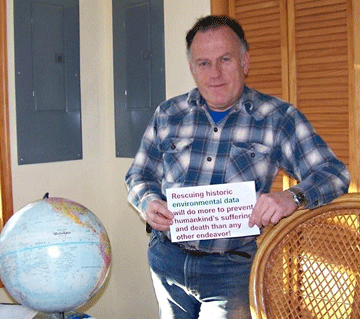
|
Volume XVII, Issue 12 - March 19 - March 25, 2009
|
|
Columns Reviews |
Weather Watchman
Meteorologist Richard Crouthamel looks
far beyond the five-day forecast
| Prediction can improve the quality of human life by forecasting floods, preventing starvation and halting outbreaks of wind-borne diseases such as malaria. |

by Vicki Marsh with Diana Beechener
Save the past to save the future. That’s the mission of weather warrior Richard Crouthamel. The retired Deale meteorologist uses weather history to help developing nations — in Africa, South Asia, the Caribbean and Central and South America — withstand the forces of nature.
Crouthamel’s work around the world convinced him that historical environmental prediction will help people even the odds.
“We can save lives by predicting floods, storms, hurricanes and tornados,” Crouthamel says. “We can also provide information for construction of roads, bridges and buildings.”
Early in his career, the 63-year-old scientist learned that when we are unaware of our history, we are doomed to repeat it.
Famine
In Bangladesh in the 1980s as a forecaster in the international office of the National Weather Service, Crouthamel’s life was changed by a poor rice farmer who depended on seasonal rains — and luck — to feed his family.
The farmer told the scientist that he planned for drought every dozen years. “I have been farming for 12 years and we have had one drought,” the farmer explained.
The scientist was shocked to see so much rest on so little.
To discover the actual pattern of Bangladesh’s droughts, Crouthamel turned to history.
“I went back through their weather service data and learned that the frequencies of droughts in the southeast of Bangladesh are every six years. So this farmer lucked out. However, his luck didn’t last.”
A catastrophic drought swept the nation two years later.
“That droughts led to the death of many of the residents,” Crouthamel says. “I believe that historical weather data would have saved their lives.”
Flood
Prediction can help people flee catastrophes as well as prepare for threats.
In Nicaragua, Crouthamel and a team of National Oceanic Atmospheric Administration workers helped after Hurricane Mitch’s devastating hit in 2000.
“The Nicaraguan government had misforecast by hours of time and by five or 10 feet as far as the flood level,” Crouthamel said. “Thousands drowned.”
Again, the problem was missing history’s lesson. The Nicaraguans had only three years of weather data to work with, and their tracking systems were outdated.
“The U.S. government gave them the same weather history that we use here and set them up with new tracking computers and software. Future forecasts could be accurate to within minutes and inches.”
When the George W. Bush administration cut funding for the Nicaraguan project, Carouthamel cut his ties with the government.
“That was the turning point,” he says. “I became disillusioned and retired early.”
Crouthamel’s Life-Saving Mission
“I knew that collecting historical data could help these poorer countries by forecasting upcoming national disasters,” Crouthamel says. Thus he became a man with a mission
To gather that data, he founded the International Environmental Data Rescue Organization.
Crouthamel and his international group of volunteers in IEDRO — letters shared by his Maryland license plate — pick through archives for climate clues. Carouthamel squeezed a weather report from a note written in the 1600s. A priest in the Dominican Republic recorded a severe storm with a lot of wind that came from the east and sank 20 ships. “Chances are that it was a hurricane,” the 21st century scientist says.
“We have all this wonderful data that’s very valuable, but it’s all on paper and it’s going to be gone,” he says.
Historic weather accounts of all ages are collected and scanned to create an easy-to-use digital archive accessible online. Much of the work is done by volunteers who find him through VolunteerMatch.org.
“Now that the data is computerized and stored on the Worldwide Web, countries have the capability to predict with greater certainty,” Carouthamel says of his life’s work.
The values of prediction go way beyond Punxstuawney Phil telling you when to unpack your spring wardrobe.
Prediction can, Carouthamel says, improve the quality of human life by forecasting floods, preventing starvation and halting outbreaks of wind-borne diseases such as malaria. At a global level, it can alert architects and engineers to potentially deadly environmental stressors and track climate change.
Getting it all uploaded requires more than a scanner, translator and plane ticket. Carouthamel’s volunteers must track down neglected paper archives — in government buildings, community centers and homes — win access to the documents, set up a digital office, train local volunteers to scan and record the data. Collection itself can cost upwards of $10,000.
The foundation is hoping for $100,000 in NOAA grants for the next two years to extend its work to Nicaragua, El Salvador, Chile, Angola, Namibia and Niger. It can use your help, too. Reach the weather warrior at 410-867-1124; learn more at www.iedro.org.